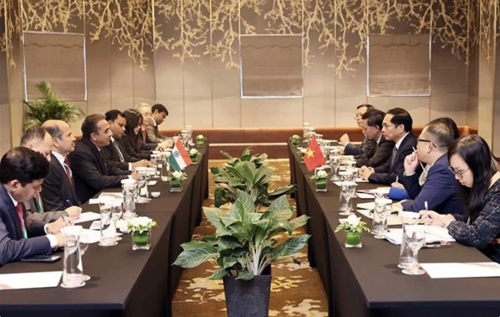Son made the remark while meeting with Indian Minister of State for External Affairs and for Environment, Forest & Climate Change Kirti Vardhan Singh on the sidelines of the 2nd ASEAN Future Forum (AFF) in Hanoi on February 25.
    |
 |
|
At the meeting between Deputy Prime Minister and Minister of Foreign Affairs Bui Thanh Son and Indian Minister of State for External Affairs and for Environment, Forest & Climate Change Kirti Vardhan Singh on the sidelines of the 2nd ASEAN Future Forum (AFF) in Hanoi on February 25 |
He took the occasion to express his satisfaction with the rapid progress in bilateral ties, particularly following Prime Minister Pham Minh Chinh’s state visit to India in August last year.
The Deputy PM recommended both sides actively implement the visit’s outcomes, including the action plan for Vietnam-India comprehensive strategic partnership for 2024-2028.
The Indian official congratulated Vietnam on the successful organization of the AFF, therefore strengthening ASEAN's centrality within the regional architecture and enhancing Vietnam’s international standing. He stressed that Vietnam remains a key partner in India's "Act East" policy.
Both host and guest agreed to increase high-level exchanges and visits. India confirmed its commitment to sending a high-ranking delegation to attend the United Nations Vesak Day celebration, which Vietnam will host in May.
They pledged to deepen the countries’ cooperation in defense, security, trade, investment, science and technology, climate change response, maritime cooperation, and maritime security. They also set targets to double bilateral trade and investment while facilitating major joint projects in strategic sectors such as transport infrastructure, logistics, high technology, rare earths, and oil and gas.
Highlighting the nations’ shared values and common interests in building a peaceful, stable, and prosperous region that respects international law, Singh stated India will strengthen coordination with Vietnam and ASEAN.
He also voiced India's support for ASEAN’s centrality in the rules-based regional architecture as well as for the peaceful resolution of disputes in the East Sea (aka South China Sea) in accordance with international law, particularly the United Nations Convention on the Law of the Sea (UNCLOS) 1982.
Source: VNA